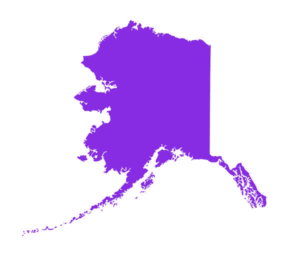
“I am the Light of the world; he who follows Me will not walk in the darkness, but will have the Light of life.” –John 8:12
Already stirring the hearts of Christians living in more temperate zones, John 8:12 has an even deeper meaning for those who’ve lived through an Alaskan winter where the cloud-hidden sun never rises much above the treetops and the cold nights are 19 hours long. In a place like California where Christmas is t-shirt weather, it’s hard to appreciate a warm summer day in the same way an Alaskan can.
 Sharing the light of the Lord with others is similar. Those who’ve been born again into a life that knows Christ’s light can appreciate it in a uniquely deep way. Being able to share this light with others is what makes being a pastor so inspirational.
Sharing the light of the Lord with others is similar. Those who’ve been born again into a life that knows Christ’s light can appreciate it in a uniquely deep way. Being able to share this light with others is what makes being a pastor so inspirational.
Explore a Christian Ministry Degree – Request More Info Today!
Following your calling to become a pastor in Alaska is a process of four important steps. Covered in detail below, these will take you down a road that involves education and gaining experience in leadership and church activities. Finally you’ll also need to understand the business-end of establishing a congregation.
Learning how to become a pastor in Alaska is itself a rewarding and challenging journey, and along the way you can find confidence in knowing that you won’t be walking alone.
Steps to Become a Pastor in Alaska
Step 1. Earn a Bachelor's Degree in Christian Ministry, Pastoral Studies or Other Similar Major in Alaska
The first step in preparing to become a pastor is education, and you'll find some of the most diverse classrooms in the nation in Alaska. While Anchorage is the state's preeminent location for schools that offer bachelor's degrees in subjects like Biblical studies, religious studies, and ministry studies, places like Fairbanks, Juneau, Wasilla, and Sitka also offer on-campus or online options for earning a relevant bachelor's degree.
In addition to studying topics like speech, communication, and history, there's a strong emphasis on religious studies covering the Old and New Testaments and religious scholarship.
Once you've earned an undergraduate degree in a Christianity field you'll have an underpinning knowledge that prepares you to move on to roles within your own church that demand increasing responsibility and expertise.
There are no shortage of opportunities to hone your skills and gain experience in Alaska. You can find service projects in remote villages, mission trip opportunities, or get involved with community service projects that address social issues like the ongoing drug overdose epidemic that in 2021 claimed the life of an Alaskan every-other day on average.
Rising to the challenge of what you're called to do, a Master of Divinity is ultimately the goal of education. Earning a bachelor's degree is the first step towards this.
Step 2. Look for Ministry Jobs and Gain Experience Serving the People and Churches of Alaska
Serving as a pastor requires knowing what people need, and you gain this insight by working in the field. Having a relevant bachelor's degree can open up doors in your community and at your local church that were previously unavailable.
This could be a mid-level position in children's education with a Sunday School program, or a leadership role helping with community outreach and evangelic ministry.
Pastors at the Anchorage Baptist Temple host recovery groups for men and women suffering from different types of addiction, among many other events. ChangePoint does mission work with the Anchorage food bank, in prisons, with vulnerable children, and as part of a youth outreach program.
As you gain experience and education you can also step into more mid-level ministerial jobs, doing things like leading Bible study groups as a men's or women's group pastor.
Step 3. Earn a Master of Divinity (MDiv) or Similar Graduate Degree in Alaska and Establish Your Role in Christian Leadership
The next step in living out your calling is to establish your educational bone fides with a Master of Divinity or similar degree in a field like ministry or theology. The represents a new and exciting stage of your professional development.
Graduate-level degrees in this field cover key topics and may offer concentrations in subjects like:
- Ministry
- Religious studies
- Bible studies
- Missionary studies
- Theology
- Pastoral care and chaplaincy
Graduate programs commonly include a supervised field ministry experience where you can actually live the word in the field and experience what it feels like to become a true leader. Where you might have once participated in the planning of a ministry event, now you’ll lead events and transform concept into action.
Online programs give your busy schedule more flexibility, whereas on-campus programs offer a in-person experience with your peers.
This is the point where your spiritual and professional life will merge together and allow you to realize God’s plan for why you were put on this earth. It’s an exciting time and is the beginning of a long journey of spiritual fulfillment and service.
The rules for becoming a full pastor are different for every church, but at this point with your level of experience and education it’s time to start considering when you’d like to apply for ordination.
Salary Expectations for Pastor Jobs in Alaska
The US Department of Labor reports that clergy members in Alaska earned an average yearly salary of $47,000 in 2020. Representing more experienced clergy, those in the 75th-percentile earned $64,130. Clergy at the top ten percent earned $78,750 or more that year.
In 2020 the US Department of Labor reported that directors of religious education and activities earned an average yearly income of $60,630 in Alaska. More experienced pastors earned $69,580 as represented by the 75th-percentile. The most experienced pastors, represented by the 90th-percentile, had a salary approaching six figures at $95,350.
Step 4. Consider Forming a Christian Ministry of Your Own in Alaska
Some pastors may feel the strong call to start their own church. If you’re in this unique category there are some important steps you’ll need to take at both the state and federal levels to establish your own church.
At the state-level you’ll need to:
- Apply for a business license with the Alaska Department of Commerce, Community, and Economic Development (DCCED).
- If you’re going to be a charitable organization you need to register with the Alaska Department of Law.
- File Articles of Incorporation with the DCCED ($50 fee).
- For more detailed information, consult the DCCED’s Nonprofit Community Association Handbook.
To register as a federal 501(c)(3) nonprofit with the IRS you’ll need to:
- Apply for an Employer Identification Number (EIN) using an SS-4 Form.
- Draft Articles of Incorporation that describe your church’s governance and management system. You also need to draft a Declaration of Trust.
- Submit a Form 1023 to the IRS ($275 fee); this is your official application for non-profit 501(c)(3) status.
By this point you’re ready to begin down your path towards bringing the Lord’s light to your fellow brothers and sisters. It’s an exciting and rewarding journey that takes perseverance, and now is the time to start.
2020 US Bureau of Labor Statistics salary figures and job market trends for Religious Workers, Church Directors, and Clergy based on state data, not school-specific information. Conditions in your area may vary. Data accessed January 2022.









